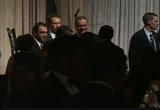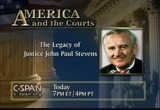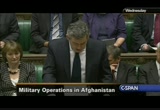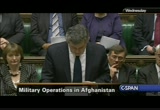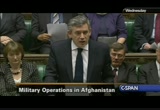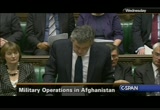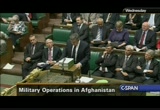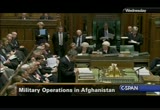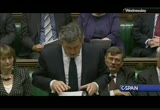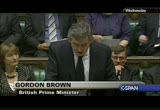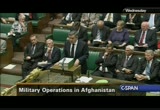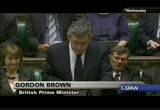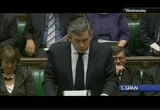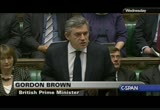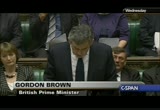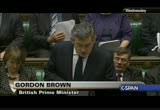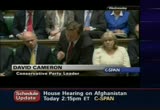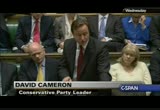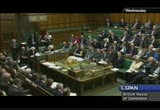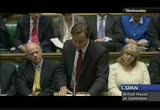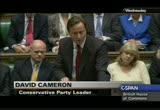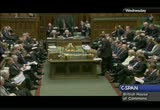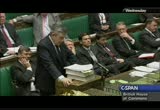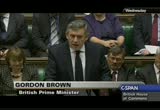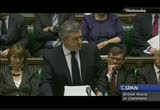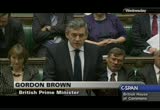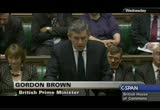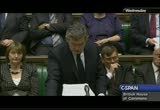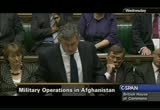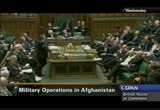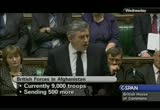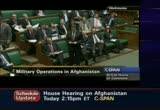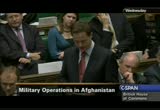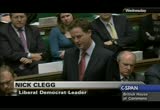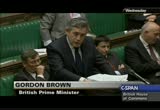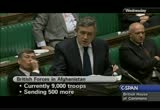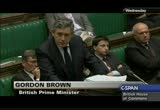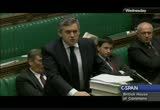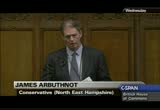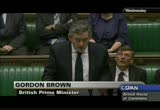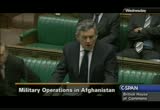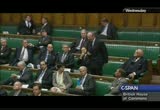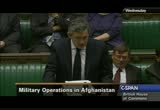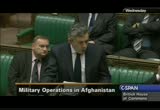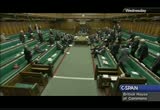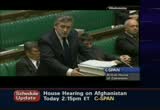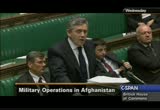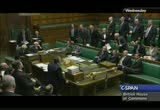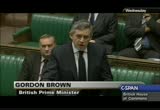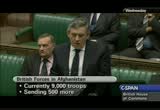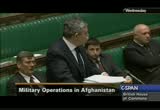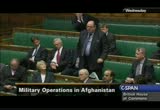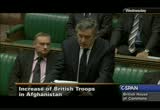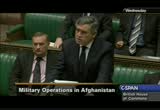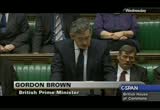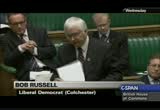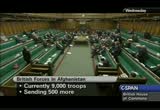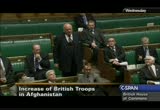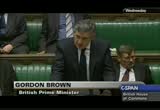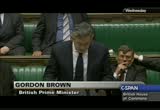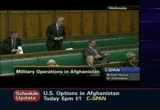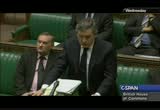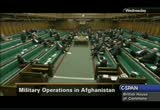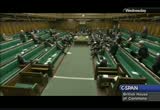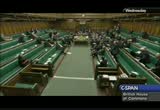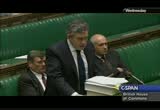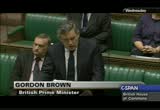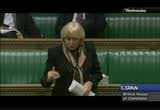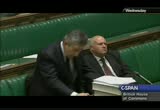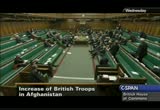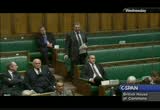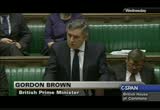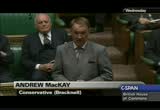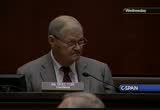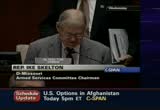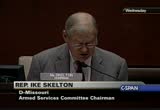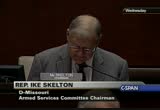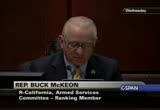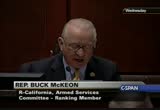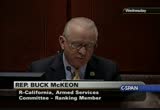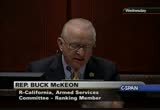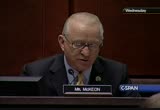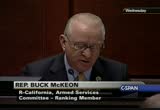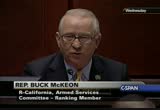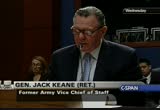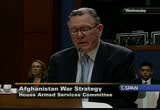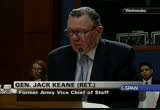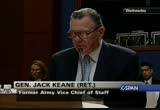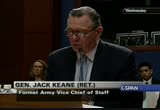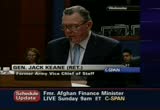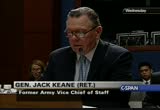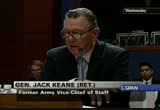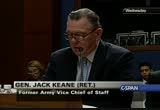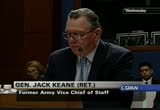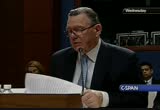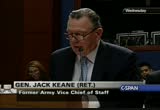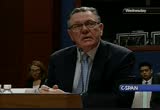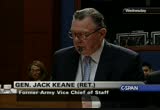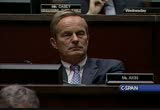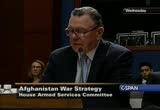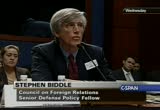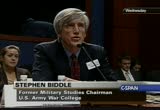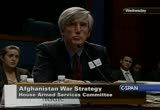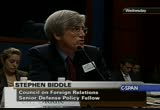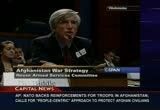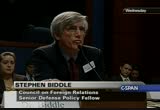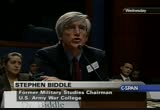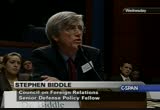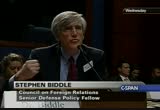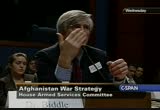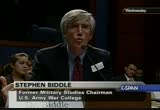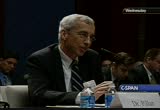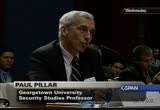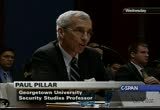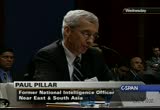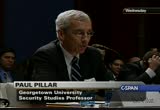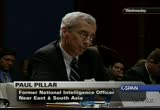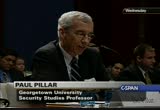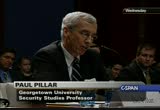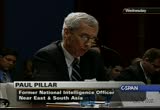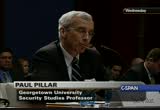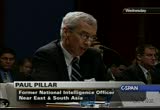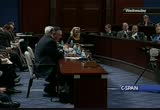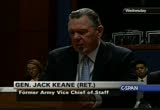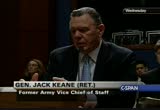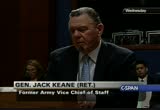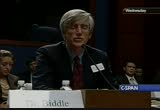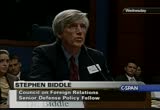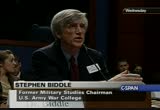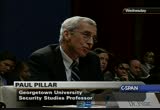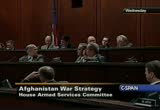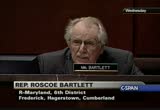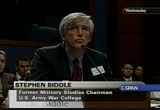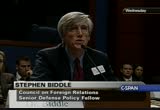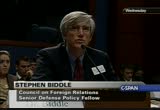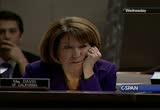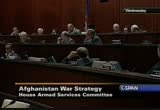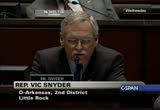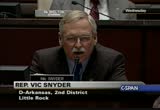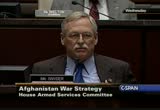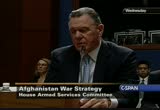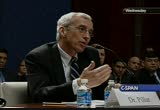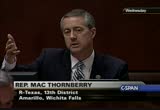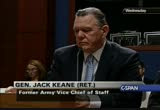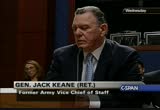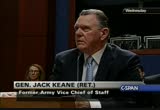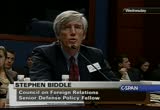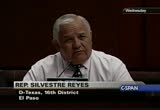tv HLN News HLN October 17, 2009 1:00pm-3:30pm EDT
1:00 pm
1:01 pm
>> british prime minister gordon brown discusses military personnel as well as family and veteran care. he also comment on home prime minister's questions, sunday at 9:00 p.m. eastern on c-span. >> this week, british prime minister gordon brown promised to spend -- sen 500 more troops to afghanistan, but only if nato and the afghan government do more to help fight the taliban now, to his remarks. they're a little over an hour. >> with permission, mr. speaker, i would like to make a statement on afghanistan and pakistan. first, with our work on the
1:02 pm
government of afghanistan to combat al qaeda and the taliban, second, the next stage of our work that the armed forces insulins are undertaking there. the conditions that we are undertaking are for the best possible protection of our troops, especially against the growing threat of electronic devices. mr. speaker, earlier this afternoon we honored those who have died serving our country in afghanistan. today i also want to honor and think all those who serve and who have served there. each time i visit them as i did a few weeks ago i find myself in awe of the immense skill, encourage and sacrifice of our forces and it's right that we also put on the record of this house and for times to come our gratitude for all our armed forces in measurable security. i think we should pay tribute to the service of our allies. including that of the 873 american soldiers who have been killed in the last few months.
1:03 pm
and our two closest provinces the danes and the astonians who have suffered among the largest losses of all. now, every time i read to this house the names of those who have lost their lives in afghanistan, and every time i write a letter of personal condolence of their families, every time i meet those who have been wounded, i ask myself the question that has been asked already today. whether we can justify sending our young men and women to join our allies to fight on the other side of the world. and i have to conclude that a when the safety of our country is at stake, we cannot and will not walk away. that three-quarters of the most serious terror plots against the u.k. have roots in the border and mountain areas of afghanistan and pakistan. that as our security services report directly to me while the sustained pressure on al-qaeda and pakistan combined with military action in afghanistan is having a suppressive effect
1:04 pm
on al-qaeda, the main element of the threat to britain still emanates from al-qaeda and pakistan. and that a peaceful and stable afghanistan would be a strategic failure for al-qaeda. so our objective is clear and focused. to prevent al-qaeda launching attacks and threatening legitimate government in afghanistan and pakistan. but if we limit ourselves simply to targeting al-qaeda without building the capacity of afghanistan and pakistan to deal with terrorism and violent extremism, the security gains will not endure. so over the last two years we have sought to build and support the afghan army and police and to work with the pakistan security forces. our strategy is dedicated to counterinsurgency on what we have called afghanization. this guiding purpose reinforced in our strategy and in the nato strategy in april is at the heart also of the announcements i'm making today.
1:05 pm
mr. speaker, first of all, i'll work at pakistan. at the meeting of friends of democratic pakistan which i chaired in new york september the 24th together with president zadari and president obama there's a clear plan for stabilization and a policy that will assist reconstruction of those areas of pakistan where there has been military action recently. we welcome the success of the pakistan government that decided to take action against taliban in swat and other areas and there's a widespread understanding and it is vital that economic assistance be provided in these liberated areas of pakistan as soon as security conditions allow. the secretary is announce ago further british contribution of 10 million on top of the 22 million we have already provided
1:06 pm
for humanitarian assistance in these areas. second, mr. speaker, in afghanistan we will now move further and faster to implement our strategy. one that starts with training, mentoring the afghan army and police. and the more the afghans can take responsibility for security, the less our coalition forces will be needed in the longer term and the sooner our troops will come home. in recent weeks i've discussed this approach with president obama, secretary of state clinton, secretary-general rasmussen and i've met admiral mullen and generals petraeus and mcchrystal as well as with our own military commanders here and talked to those on the ground. britain sports general mcchrystal's ambition to accelerate the growth of afghan security forces. an ambition that rise at the heart of the report that he has made with the afghan army building to 134,000 within a year. that is by next objection. -- october. the afghans are committed to the
1:07 pm
recruitment of 5,000 soldiers a month from next spring. the new nato training commission established at strasburg expects to help 40,000 afghan soldiers in 2010. britain is setting up a new training center which will train around 900 junior officers and ncos next month. in helmand last year there were only 4,200 officers. this year there are 50% more, more than 6,000. at our request the afghan government took to sent more units to support operation panthers claw and while those units were there, they were not fully ready for the task and a province that faces 40% of the violence in country, we need bigger afghan participation and we need it now. that's why i can announce the afghans will set up a core headquarters in helmand that british forces will be partner 5,000 of the 10,000 afghan troops the coalition will be training in helmand not
1:08 pm
embedding members with the afghan units as we've done in the past but working right up to the command chain and the top of it. in future operations, the protection of populated areas must be the shared responsibility of afghan and coalition forces. this will be to the new benchmarks and timelines we and general mcchrystal will set out as part of a new framework to the transition to afghan authority. afghan forces taking responsibility for security for the afghan people and doing so area by area. now, mr. speaker as 19 light brigade completes its duty, we will congratulate the men and women the area in the hard fought summer and joining us our best wishes to 11 light brigade who are replacing them. they will deploy with further enhancements to deal with the deadly threat from explosive devices. including having more specialist troops and more equipment to protect our forces, to find and
1:09 pm
diffuse the ieds and to identify and target the networks who built and set them. 19 brigade were able and i think this should be noted to prevent 1200 explosive devices from being detonated. they will pass on that experience of success to the successors together with the equipment enhancement i announced on my recent visit which are now coming on stream later this month and next to help them. that is increased unmanned aerial vehicles for civilians, 30% increase for desert hawk and next year 80% for reaper. and an extra 20 million increased in the total of protected vehicles since april and the first helicopters to be deployed in helmand in two weeks. now, this is highly specialized equipment. it must be manufactured, delivered and adapted. personnel must be trained to freight before it can be put in
1:10 pm
action but no one should doubt our commitment to responding as fast as we possibly can to this new and deadly threat of the taliban nor should they doubt the scale of our financial commitment to our soldiers and to this campaign. since 2006, '7 we have increased annual military spending on the afghan operation spending from the treasury reserve that is in addition to the defense budget from 700 million pounds to 1.5 billion to 2.6 billion and now to more than 3.5 million this year. so we are determined to provide our forces with the resources they need to keep them safe and we're also determined to make the right decisions about equipment and about troop deployments as part of our wider strategy. so to meet the changing demands of the campaign we should require greater concentration of our forces in central hell mapped. -- helmand. that one of the british units the regional battle group for southern afghanistan will be redeployed to helmand with immediate effect.
1:11 pm
and mr. speaker, to support our plan and to train more afghan soldiers and police, while at the same time maintaining the security of our forces, i've agreed in principle a new force level subject to the following conditions. the first is that a new afghan government demonstrates its commitment to bring forward the afghan troops to be trained and to fight alongside our forces. and i talked yesterday to president karzai and abdullah and received assurances that it is determination it will happen. every soldier and unit deployed to afghanistan is and must be fully equipped for the operations they are asked to undertake. and third, that our commitment is part of an agreed approach across the international coalition with all countries bearing their fair share. the combination of force levels, equipment levels and tasks that i'm setting out today follows the clear military advice from our chiefs of staff and from our commanders and on the ground on implementing our strategy and reducing the risk to our forces.
1:12 pm
and it's on this basis that i've agreed in principal to a new british force level of 900,000 which will be put in effect once these conditions are met. mr. speaker we do not yet know as i have said earlier the results of the first round of the afghan elections. but while these were the first ever elections run by the afghans themselves and took place against the backdrop of a serious insurgency we cannot be anything other than dissatisfied with the intimidation, the corruption that has been exposed by afghanistan and international observers. the electoral complaints commissioner set out a process of investigation including the disqualification of fraudulent votes and this process must be allowed to run its course. when i spoke to president obama last week we agreed that when a new government is formed, the international community including afghan's neighbors must have a new contract including this commitment to growing the afghan army, tough action on corruption, more
1:13 pm
inclusive political process, include reaching out to the reconcilable elements of the insurgency and stronger afghan control of local affairs. these are the necessary changes i discuss with president karzai and dr. abdullah yesterday. without these changes the efforts of the military will be hampered and the new afghan government will not gain the trust of the afghan people. mr. speaker, a better future for afghanistan with its village and rural population can only be forged if there is stronger governance right down to governance level. last year we doubled the number of advisors that we have put in for civilian help and now our joint civilian military team is the first in afghanistan are supporting not just the governor but also district governors and village shuras. during the last year four new district governors have been appointed in helmand. the afghan government is functioning in 9 out of its 13 districts compared to 5 last year and we're supporting community councils to consult
1:14 pm
with thousands of local people to ensure this work has immediate backing we have an extra 20 million for that stabilization work in helmand. money that is being dispersed increasing by 1,000 a year for each of the next three years building a new police training academy and building new facilities for district governors and we're also working with coalition partners to extend such support for the 34 provisional governors and the 400 district governors right across afghanistan. british aid, therefore, continue to pay the salaries of teachers and doctors but we are also ready to fund and partner the first afghan teams that are sent for these stability purposes from kabul to work alongside us in helmand. we want to re-enforce the hard won gain of our troops in this hardest of summers while fostering greater afghan responsibility for their own affairs. mr. speaker, we'll have prevailed in afghanistan when our troops are coming home because the afghans have not only the will to fight but the
1:15 pm
ability to take control of their open affairs so the right strategy is one that finishes this job. -- the right strategy is the one that finishes this job, giving afghans the tools to take over themselves. a safer afghanistan -- a stronger pakistan is also wasted for britain. we must never again let the territory in this region or any region become a base for terror on the cities and airports of britain. we have the right strategy and we will see it through. and i commend this strategy to the house. >> we have long called for regular reports to parliament on afghanistan and pakistan. of course, mr. speaker, we very much welcome this statement. / on our overall strategy and afghanistan, pakistan president obama's review, the prime minister said he supports the
1:16 pm
general and vision, but does he basically agree with general mcchrystal that we need a proper insurgency strategy in afghanistan? the prime minister rightly says that our military effort should increasingly be geared to afl army. we agreed with that and support that and we welcome the extra afghan troops that are going to bgohi?;be in helmand. but in order for this to work, does he agree with us that the afghan national army needs to be of thepresentative country as a whole and can he tell us what they are doing on the front. it was widely seen as fraud and corrupt. if reruns of contests aren't possible does he agree that the clearest possible message should be sent to president karzai when british soldiers and fighting and dying for his country, the corruption and ineffectiveness of his government is completely unacceptable? on the issue of the taliban, don't we need to get much smarter at distinguishing between individuals who pose a
1:17 pm
real long-term threat to the security of the u.k. and its allies and those who do not. while we should not be negotiating with the leadership of the taliban, we should be breaking up the movement, separating out those who are more motivated by money or by other factors rather than ideological commitment. can he tell us a bit more what progress is being made on this front? as the prime minister has said, it has a direct link to the security here in u.k. whilst the success the president has talked about in the swat valley is welcomed. the recent siege just a few miles from the pakistan capital was deeply disturbing. can he tell us what the british government is doing to increase the pakistan's government ability and capacity to deal with the rise of extremism? and committee address specifically what he thinks is now being done if anything to shut down the shura. on equipment, the prime minister has said that the deployment of extra troops is conditional on the military assuring him that
1:18 pm
they have the necessary equipment and training. won't many people think well, isn't it the government's responsibility to make sure they have that necessary equipment? and will they also ask why is it after eight years we are still playing catch up on equipment. as we've said repeatedly, helicopters are crucial. can he tell us what progress has been made in getting more chinooks to theater. the prime minister has said the first helicopters will be deployed in the next two weeks. committee ensure all all six helicopters will be in iraq by the end of the year as he promised? now, we welcome the delivery of the new ridge back and mastiff vehicles, only 1 in five of the mastiff fleet was classified as fit in june, 2008. can he tell us whether that position, that completely unacceptable position has now improved? now, the prime minister tell us that the troops going to
1:19 pm
afghanistan will be properly trained and equipped. yet today we see that training for the territorial army including some going to afghanistan has been cut. won't people conclude from that that the prime minister is not fully on top of what is actually happening in his own government? on the additional 500 troops, the prime minister has announced, committee confirm that this is what the military actually asked for? can he also make clear that those have their stay extended? i want to turn what the prime minister has said to me when i asked about the military's request for extra troops in the summer. on july the 13th, mr. speaker, in the house, i asked the prime minister very specifically whether commanders asked for more troops to do more things and if he was specifically and i quote asked for 2,000 more troops? the prime minister replied, i have been reassured by
1:20 pm
commanders on the ground and at the top of the arm services that we have the manpower we need for current operations. yet, we now know the military did ask for 2,000 more troops in march of this year. can he tell us why that option was rejected? and can the prime minister also explain why frankly he gave such an evasive answer on such an important issue as troop numbers? doesn't he understand we are only going to carry the public's confidence if we're straight with them about the choices we face. finally, let me ask what is being done to put the entire efforts in afghanistan on a proper footing in whitehall. we need a clear sense of direction from ministers and who is in can the prime minister tell us today what he's doing to make that happen? let me be clear we support the in afghanistan, provided we are realistic what we're aiming to achieve and to ask the overriding aim to train those afghan forces so they can take
1:21 pm
responsibility for their own security and our soldiers can come back home. >> mr. speaker, i'll answer every specific point he has raised. but i do want -- i do want to stress that the decisions that we are announcing today have been made after the fullest possible consultation with our american employees, with the secretary-general of nato and with our own military commanders, our commanders on the ground and the chief of the defense staff and the chief of the general staff and i've regularly met them over the last few weeks to deal with these issues. i think he should also be aware that the national security committee has been meeting every week throughout the summer to review both events and dispensations and that national security committee has the advantage of not simply being a committee like ministers and the development secretary and the defense secretary and myself and others. it is also in its membership the
1:22 pm
commanders themselves our security forces and those who can advise us on the issues on the cases. so the idea that this is not at the center of government being properly coordinated by a national security committee with the advice of commanders at all times and with regular meetings and discussions with our allies is completely not the case. let me deal with the question about pakistan. he's absolutely right to say that there are risks in pakistan as the pakistan taliban in particular are engaged in activities against the pakistan government. but he is also -- he should note that what we've seen in pakistan in the last few months is the most encouraging coalition of forces. the opposition parties as well as the government with the
1:23 pm
security services as well as the army determined to take on the pakistan taliban in those areas where it had got a foothold, removing them from the territory and are now doing a incredible amount of work to make sure that they can get back in their own areas. countries not just ourselves and not just america, we had representation from all the major countries in europe and countries from elsewhere wanting to support the efforts of the pakistan government to deal with this problem that they face. i have an assurance from president zadari because i know there have been suggestions and the home secretary in pakistan very recently and the foreign secretary is in very direct touch they plan to take their campaign from the swat valley into waziristan at some point and they are planning about how they can deal not just with the pakistan taliban but the afghan taliban and also al-qaeda itself. so what is encouraging having
1:24 pm
defined the problem as one that covers the border areas of both afghanistan and pakistan is that while for years we had hoped the pakistan authorities would take action the pakistan authorities are now taking action recognized as the leader of the opposition said that the terror threat is very close home to them. now, i come to afghanistan and i was asked about general mcchrystal's report and also about a number of issues relating to equipment. i want to make sure that people understand the process of consultation that we've gone through and also the logic of the decisions that we made. general mcchrystal's report and the basic elements off it as to the principles of future operations are to move from counterterrorism to counterinsurgency to move from an emphasis on holding areas to being with the largest areas of population and winning the support of hearts and minds and so the aim is not simply to eliminate taliban but to win the support of the afghan people.
1:25 pm
and it's for that reason that he is proposing and rightly so because we ourselves had proposed this some months ago that the partnering or mentoring of the afghan forces to build up the afghan army and security forces is absolutely central to everything that we do. when we went in on panthers claw we wanted the afghan forces to hold the ground. they came but they were not strong enough or well equipped enough to do so. we need an afghan army that is properly strengthened and properly equipped and that means as he rightly says getting a balanced army across the country but getting troops that will come from other parts of the country to helmand where 30% of the violence takes place. so our aim is to move from this 90,000 afghan army to 134,000 to train the troops but also to have them in action with our own troops right up to the headquarters level. and we believe that in the next year, that number of an extra 50,000 or so can be achieved by a recruitment of 5,000 a month
1:26 pm
and by these forces being sent into helmand. as far as the integration of people who are part of the taliban now or part of the insurgency who could be persuaded to come over, this is a central element of the work we are doing and the foreign secretary emphasized that in a speech a few weeks ago. the importance offered has led general lamb who is a -- one of our people who acted with great distinction in iraq has gone to work with general mcchrystal on this very process of reintegration and splitting the taliban. there are pastun nationalists. there are people who are hired for a dollar or two a day. there are people who are young people from the areas who want to assert their independence and there are taliban and al-qaeda idealogs and we have got to separate these people from those people who worry that they are hit with an occupying army from those people who simply want the al-qaeda or the taliban to
1:27 pm
regain control off pakistan and practice terrorism -- in afghanistan and practice terrorism in that country. so our determination at political reconciliation is something that i believe that all parties will share but it's important to shoat this. .. -- important to show this. the helicopters, there were two soon and we plan to get six there as soon as possible. the problem has been we have got to reblade, if you'd like, the helicopters from the work in iraq. .. intensity end very hot atmospheres, they are going there next summer as well. there have been 500 vehicles
1:28 pm
sent to afghanistan, if i am right, in the last time frame carried the equipment is second to none now. and of course, we want to get more there as soon as possible and we are making that happen. i want to emphasize that the territorial army is part of the mission in afghanistan and anybody who goes to afghanistan has got the assurance that we will do everything in our power to make sure that they are fully equipped for the task they undertake. the numbers and the issues that arose about the numbers of troops that we have in afghanistan, we have before us earlier this year a number of options for different kinds of operations that we might mount in afghanistan. we had a necessary decision to make about more engineers going to afghanistan to protect ourselves against the ied threat.
1:29 pm
and we had a range ofç options that we discussed and we decided that we would raise the number of troops from 8100 to 9000. that is what we would do until we could see, first of all, what was happening with the american strategy and also would weaken -- what was a result of what happened during the election campaign. we raised the number from 8100 to 9000. we are raising it again from 9000 to 9500. we're redeploying the battle group into central helmand because that is the best use of it as we try to undertake the task of protecting our forces and at the same time, conducting our support exercise for afghan troops. the decisions that have been taken have been agreed by all our military advisers as the right steps to take for the future. the reason we have put conditions on it is obvious. we cannot train the afghan
1:30 pm
forces without having the afghan mcgovern and making these forces available to be -- the afghan government making these forces available to be trained. i believe what we are saying today is consistent with what the americans will decide. and of course, we want to have -- be absolutely sure that the troops that we send there are properly and fully equipped for the future. in other words, whenever there has been a need for us to both protect our troops and to move forward a campaign, and now that the campaign is about afghans taking more responsibility, we have to be prepared to center to make the investment, to provide the finance, and to support the troops on the ground. i hope that the opposition party will be able to maintain what has been a consistent bipartisan approach to a necessary exercise in afghanistan and we can proceed on the basis that we have support in all quarters of this house for the activities we are undertaking.
1:31 pm
>> mr. speaker, i would like to thank the prime minister for his statements, quite a lot of which i welcome your we have argued on these benches that we cannot succeed on half hp with half measures, with half baked thinking. time is running out with the mission in afghanistan and we need a radical change in direction. the prime minister set out today a number of conditions on which the deployment of extra british troops will depend. troops will depend. but does he agree with me that ultimately the key condition is they should have a realistic chance of success if this requires above all a credible new strategy. the public is rightly cautious about the drip, drip to cumulation of the british forces in afghanistan without any overarching strategy to work from or realistic goals to work towards. more troops may be necessary, but they will not be sufficient to guarantee success. i welcome what he said today on new helicopters and more mastiff
1:32 pm
in ridgeback vehicles. we need more details. and also on whether the poorly armed land rovers have actually been withdrawn from service as the government has promised in the past. but does the prime minster not agree with general mcchrystal's conclusion that just focusing on force or resource requirements misses the point entirely. that there is more to this than just boots and equipment on the ground. does he not agree that the key and central failure in afghanistan is the lack still today of a coordinated international plan. what then is he doing to advance a political search to run alongside any news military surge. secretary of state clinton said this week that everyone calls himself a taliban is necessarily a threat to the united kingdom or to the united states. i welcome what he said on that just a minute ago, but can he be more precise. what programs -- he is my. i just asked him to address this.
1:33 pm
what programs, what budget and will staff has been allocated to reconciliation across the policy in afghanistan. beyond the borders of afghanistan, beyond the borders of afghanistan, what progress is being made to bring other countries in the region together to share intelligence on the taliban, al qaeda, and to tackle the opium trade. on military strategy, general mcchrystal has highlighted the need to defend urban centers. does the prime minister can see that it is now better to focus our forces on defending such hot more populated areas rather than operating from remote outpost and a taliban dominated countryside and helmand? and finally the karzai government has spectacularly failed to win the trust of the afghan people. it is beset by corruption, crime and influence. the prime minister talks in his statement today about the need for a more inclusive political process, but let me press and again on the issue i raise with an earlier. does he agree that regardless of
1:34 pm
electoral outcomes, only a full government of national unity can now deliver a platform progress in afghanistan? >> mr. pryor mr.? >> i think his first remarks were that we did not have any strategy for afghanistan and we need to think it through. but i think his second set of remarks reveal that he hasn't understood that our strategy is to get afghans more responsibly for their role, to train the afghan army to military, to train up the security forces, to train up the police and to make sure that several civilian government in afghanistan is more effectively done. and that is why when it comes to some of his proposals i have to correct them yes, general lamb is working on how he can help integrate people who will be in the civilian society. but in the end, the afghans themselves will come together and make sure that they can work together for the future. and equally as far as the
1:35 pm
government of national unity is concerned i don't think it is for us to prescribe what the government should be. it is for the electorate and therefore them to be taken into account by president karzai and all the other people who are involved. and it is necessary to have a refund of the election. that is something that may have to happen and have to accept. and that depends on the electoral commission and the recommendations. our strategy in afghanistan i think is to build up the army as quickly as possible. to build up the place from about 98002 about 150,000 there to build up the civilian shuras and the district government, provincial government in afghanistan so it is more effective, to be in a position to be in area by area controlled by afghanistan back to the afghan people. and that seems to be the most
1:36 pm
sensible policy for dealing with an. as far as vehicles are concerned, i think there's been a seachange in the way we have brought in mastiff in ridgeback spirit i think there is something we are looking at at the moment. but i think you will hear from the troops on the ground and the world that the ied threat is what we'll, the vehicles that have been brought in in recent months are those that are by far the best that we have ever had and the best animal. we will do everything we can to ensure there are better vehicles in the future. as far as president karzai is concerned, i agree with him. we cannot tolerate a situation where he we have british forces, allied forces in afghanistan and we have a government who is tolerating corruption. that is why president obama and i, that there's got to be a contract that is monitored to deal with specifically corruption to do with the appointment of governors in a fairway so that we can deal with
1:37 pm
corruption in the provinces, to do also with the training of afghan forces for the future and to do with something i wasn't able to talk about today but is absolutely important to the afghan people, and that is to create a climate in which small businesses can develop an afghan people can have a stake in the future of the country. that is the way for it and i hope you will find a way to support it. >> order. i want to accommodate as many of the 30 members who are seeking to catch my eye. so i'm looking for single, sure, questions. and of course question. >> calling for british troops come out of afghanistan, and they represent the use of millions of people in this country. does the prime minister not realize this is a war that does not enjoy popular support, it has gone on for eight years, it has cost many lives and it has no end in sight. can he bring order to end it and
1:38 pm
not to continue the occupation? >> i have to say that our strategy is to wish greater situation in which british troops can start to come home. and that by strengthening the afghan troops to do their job. i think he has to remember the circumstance in which we went to afghanistan in the first place. it is a 41 nation coalition with us here can every other country that has been involved in afghanistan have put either troops or equipment or civilians into afghanistan and it is important to recognize that there is widespread support across native and beyond nato for this operation. so i think the more people consider the final few on afghanistan, we should look at the strategy that we are imposing and that is a strategy that is afghanistan more control of army and police forces to enable our troops to come home over a period of time. >> we still haven't heard a proper answer on the request for 2000 extra troops. one of the key aspects of
1:39 pm
bringing security to the afghan people is the training of police who are free from corruption. and iraq, we had the experience that if the iraqi army men toward the iraqi police, that was of great assistance. is the same sort of approach going to be adopted in afghanistan? >> that is one of the approaches that we are considering. the e.u. responsibility for training police forces has been with germany. they have done a great deal, but moore has got to be done. it is possible, it is a situation where the army helping the police forces and it is possible also that we can have more civilians training police forces as well. but i agree, you cannot just talk about training the army. i said that the buildup of the police force is recommended by general mcchrystal. it is something from 98,250,000 so there's a big increase in the police forces but they have to be in the right places and they
1:40 pm
have to be paid and free of corruption. that is an order that the afghan government has got to accept. >> is my friend aware that the whole house would be much reassured by what he said about the deed to reconcile and reintegrate many of those taliban, but who are so not under the direction of the three main insurgencies tech is he aware that iraq, 100,000 sunnis signed up in reintegrated and paid by the americans to join the iraqi national army in a matter of three weeks. it would be possible but does he not see that president karzai is an obstacle to this, that he is widely implicated in the fraud that took place in the election and the corruption that goes throughout the whole country. can he not see ways in which we can have much more closer involving execution and administration of politics in
1:41 pm
the country. >> i've talked to both karzai and dr. abdullah about whatever happens in this election they can work more closely together and make sure there is some common purpose. but it is the reason for them to make after what we have seen what the international electoral commission are. i agree with him, unless the corruption is dealt with in the reputation of afghanistan that the trust of people have in the government of afghanistan is a very limited. but i do also agree with what he says that reintegration has got to be such an element of what we do if there are large numbers of people who are prepared to leave, if you like, the province of the taliban and we've got to have a strategy for doing that. not just a national level but also a local level as well. that is exactly working on now. >> even with increased nato troops, the taliban can actually
1:42 pm
be eliminated. is it not equally true that it is impossible for the taliban to conquer afghanistan relying as they do on roadside bombs and suicide bombers? does the staff are not pointed to the need to convince taliban that we will stay there as long as is necessary and this means even if we are able to gradually withdraw our ground forces, we will give a commitment to a long-term nato air support working with the enlarged afghan government? >> i think he makes a very important point, that in hand-to-hand, one-to-one fighting, the taliban have lost. that is why they changed the tactics and why the tactics are essentially those of guerrilla warfare. and to booby-trap or to kill or maim our soldiers. and 80 percent of the deaths arise not just in the british fatalities, that across afghanistan from the use of ied's. so he's absolutely right that the taliban cannot win a
1:43 pm
conventional war and they can only disrupt our attempt to bring peace and stability to afghanistan. he is absolutely right also that we have got to send a message to the taliban that were not going to walk away, as he rightly suggest, but nato will stay the course. at the same time we got to be prepared to integrate those elements of the insurgency who were not part of the taliban ideologues into the framework of civilian society that has developed in the region. >> when i last visited afghan in july, i saw myself not only the terminus jobs armed forces are doing there but also the growing need of the afghan operational frontline. what i care about though is how the afghan government is being encouraged to take responsibility to the overall security situation, and could the prime minister say something more about what actually is taking on?
1:44 pm
>> the afghan security forces did take responsibility in some areas of afghanistan already. but what we have got to do is, absolutely clear that it must be better trained, better equipped, better able to deal with both a military caste and the civilian task so it is not simply army. it is also police as well. so this training and partnering has got to move a pace. training and mentoring would mean embedding in some cases british forces with the afghan forces. but what has been proposed at the moment is we have similar units of afghan and british forces working together, and with the joint command, and that would be the way for the training of afghan forces more rapid and to give an as iz: say, it is incredibly important that if we take ground and are holding ground, it is not simply british forces that are doing that. it is afghan forces. it is afghan's own forces that are holding ground against the
1:45 pm
dollar on for the future. that is where the structure is so important for the next stage. >> after eight years, what confidence can we have that the strategy announced today by the prime minister has any better chance of success than the strategies previously announced by this government? >> i think that people have recognized -- and i have to say that we have been proposing something similar for the past 18 months. unless you have a strategy for the afghan people themselves taking responsibility for their own affairs, you cannot see a week -- a way through this that does not involved troops being there for many years. what is important about what we're saying today is that it is supported by nato itself and very much in line with what general mcchrystal as saying. he has considered the american strategy. he is moving from counter- nterrorism to counterinsurgency and is focusing on winning support in volatile areas and o!eliminating the taliban military.
1:46 pm
had the same time, partnering and training the afghan port -- forces. it moves from the status quo in a way that shows that if the afghans can take quicker responsibility for their own 1(d÷affairs then we can bring or qu. ç>> david goulsbee. but does my right hon. friend agree with me that the threat posed by al qaeda applies to all of the natural member countries? and will he join me in urging some of our more reticent european allies to contribute at the same grade and dangerous level as that delivered by the british armed forces? >> he is absolutely right. has to be sharing pic before the elections i and others persuaded some other european countries to contribute more and it was a greater contribution from other countries in the run up to the elections. once the strategy is set out by president obama and then by nato itself, there is a meeting taking place in the next few
1:47 pm
days to do that, to persuade other countries that this is the right way forward for them. some countries will find it better for them but they are training afghan forces and not in military action on the ground. some will be prepared to contribute more money rather than more helicopters. some may be prepared to contradict the equipment, but everyone must accept their part of the coalition that they have got to share the burden. >> as a member of the army, you served in afghanistan. the prime minister will understand my particular interest. a large percentage of our forces in afghanistan are members of the reserve. as one of the eod trained engineers of the prime minister referred to, it is likely that i may have to go again perhaps even sooner after i asked this question. [laughter] >> prime minister, this week i was told that i may not be able to train again until next april. how can that be right clacks and more importantly, what sort of message does that send to the members of the reserve forces that the prime minister claimed
1:48 pm
to value so much? >> mr. speaker, as i said and i look at detailed by the individual cases that are raised, is that our focus, our focus is on afghanistan at the moment. those folks likely to go up to afghanistan will get the training necessary. >> i am interested in a new timeline that he mention in his statement. what happened in 2011 when canada withdraws its combat forces from kandahar which is next door to helmand province? are we expected to move in there or it is the afghan army expected to move up to the plate? what is going to happen in 2011? >> it is not the assumption that we move in. i have to say to him, yes, there will be greater presence from afghan army because its numbers would have grown by about 50000 over the next period of time. but equally at the same time, we
1:49 pm
are waiting for the americans of what they're doing. some of their troops as they announced in a previous strategy have yet to arrive in afghanistan. i think you'll see quite a few changes coming from different countries. >> afghanistan is bigger, more complex, and a more difficult problem than iraq was. the iraq indigenously carry forces are 600,000 why do you imagine we can succeed in afghanistan with less than half of that? >> first of all, pakistan is very, very different from iran. secondly, i think he should accept that the figures on giving of the army are the numbers over the next year. that is 90000, 134,000 or that is not the limit that will be placed on the afghan army or our ability to train members of the afghan army. i've already given him a figure
1:50 pm
for the place that will be trained for the future. in the end, i think we know that afghanistan's civil society at the local level has got to operate as well. where does operate successfully, sometimes through tribal, sometimes through the surest that have been developed, they can make a huge difference as well. were dealing with a different country, different conditions, but obviously the limits that i said about the training of the next year are not the limits of the limits of the future. >> how does the prime minister maintain a close interest in the poppy cultivation, and the heroin produced region, it wreaks havoc on the streets of this country. what progress is being made to reducing the amount of poppy in afghanistan? >> i think the secretary would be able to write you about the detailed success of government program in helmand. were to replace poppy
1:51 pm
cultivation we have encouraged the growing of wheat. the price of wheat has been high over the last two months and have been successful in moving thousands of farmers from poppy cultivation in two weeks army. we are now extending the program over the course of the next year and that is one way and helmand in which we are reducing the dependence of poppy cultivation. we realize it is a continued challenge but the other thing i should say is the considerable evidence that those people involved in heroin are also those people involved in placing the ied's. a lot of our surveillance work is not related to tracking those people who are engaged in this industry of not only growing heroin but also placing ied's that have caused so much havoc, but our troops. one of the things i mentioned today was the increase of civilians that will take place within afghanistan of those who are trying by day, mainly by night to plant ied's. >> in light of the considerable
1:52 pm
expertise of the british troops in training the afghans, which they have been extremely successful, the timelines stated by the prime minister will be extremely tight. is he satisfied that there are within the 11 light brigade with the further advice that he received earlier in the year, enough british soldiers to hold clear and build on that ground sufficient until enough afghan soldiers can take place? >> i agree with him that one of the big questions is how we can train afghan forces at a far more rapid pace. we are seeing that at 2000, the. not everyone of them of course i want to get training or even turned up, so you're talking about an estimated increase of 4000 a month over the next year. i talk to general mcchrystal about this and we've talked to the american authorities as well
1:53 pm
as nato. this seems a practical proposition extends are being put in place for that to happen. karzai isn't sure he can provide the numbers that will be prepared to be a credit to the armed forces and that is the first page. the second thing is this question about number's. i said earlier and i just want to make sure that the house understand what i said. i said there were a number of options we discussed earlier this year. none of these options included raising the number of forces by 2000. we discussed a number of options. we decide to raise the numbers to 9000. we decide that we would review that after the elections have taken place because a lot was about security related to the conduct of the elections. we have now conducted that review. we have been in touch with the americans, and by agreement with our commanders both on the ground and the chief of the defense strategy and others have been involved in this, i met all the chiefs yesterday for breakfast. we are agreed on the increase to
1:54 pm
9500 subject to the conditions i may. i hope people will understand. >> thank you, mr. speaker. i would like to pay my respect all those people that lost her life in afghanistan. the prime minister's statement puts emphasis on the growing of the afghan army. does he recognize that there can be some future danger in building an ever stronger army is at the same time and oldie a systemically weak and corrupt government? does the history of pakistan not point to the danger of such an equation and what has been done to mitigate those risks? >> he makes a very important point, that if we are going to have afghan responsibility for afghan affairs we need both local and national government. i would perhaps put more emphasis than he does on local government being infected for most people in afghanistan.
1:55 pm
central government is very weak indeed. i also agree with them that president karzai will hold authority in afghanistan, whoever they are, after the elections. have got to take responsible for making sure that we have a corrupt free government across the country. there is the responsibility of those who rule afghanistan to make sure that the confidence that we have placed to them by sending troops to do with the problems that they have is repaid by the cleansing of the government of corrupt activities. that will be part of the contract with any future government in afghanistan. >> the prime minister's statements was silent on the continued abject failure of the major european nato countries to provide troops on the ground in helmand province. in his comments about hearts and minds, can i suggested government should take some leadership here? because over the summer, his ministers have told me no steps
1:56 pm
have been taken by u.k. train for the goods in afghanistan and the second, no food has been cured by the mod food supply demand that is there not a case the british government to boost the economy of afghanistan and in that connection can i urge his ministers to discuss matters with u.k.-based charity for doing that on the ground in afghanistan as we speak? >> there is of course a case for this and it is something that we would want to see happen in the future. but i think he has been there. he knows the arrangements that have got to be made in an area that is otherwise quite bear to make sure that our troops are properly fed and properly equipped. we should be proud that we been able to get equipment, food and everything that is necessary for our troops to making sure that these take place. but over time, yes, he is right that we must be able to encourage local afghan industry
1:57 pm
as well. >> thank you, mr. speaker. the prime minister mentioned in his statement welcomed investments to ensure that the equipment for our very brave armed forces in theater. on the question of army vehicle, you mentioned ridgeback and mastiff and of course with a very successful other vehicles. can he assure me that there is in fact the mod are looking as a replacement for the snatch vehicle which offers protection offers so that as we move into stabilization, there is that kind of a vehicle available for our armed forces because i think she's talking about a vehicle that is made and she is absolutely right to say that it was a very important vehicle. it was very popular with our troops and something we depend upon greatly. >> i put it to the prime
1:58 pm
minister, that anyone who thinks that an afghan army recruited from six to seven mutually hostile tribes is going to defeat the taliban is living in a political cloud land? >> mr. speaker, there is a 41 nation coalition that sees its responsibility as making sure that we can deal with the threat of al qaeda and making sure that the afghan and taliban don't return to power in the way they did before. i just have to say, there are 6 million girls at school who would never wise be at school if we left afghanistan to the taliban. but more important people are safer in britain because the records of the plots that we've discovered in britain come from pakistan border area where is the taliban and al qaeda are allowed to move free, we are at risk ourselves. so whatever difficulties he diagnoses is from the history of
1:59 pm
afghanistan, and there are many conclusions you can draw from their thanks to the history of afghanistan. i think we have a duty to protect our citizens, to make sure that we do have the power to build the capacity of the afghan people to run on affairs spec is my friend aware that growing opposition in britain is that he pulled simply cannot speak victor even if we were to stay there another eight years. i for one a.m. totally opposed to increasing the number of troops. and if there is an opportunity, i would certainly vote against. >> i have to say, we've laid out a strategy which -- we have laid out a strategy that does not leave things as they are. it is a strategy that says we have got to train afghan forces and that they must be in a position to take responsibility where britishç troops and other troops and americans are taking steps now and the training
2:00 pm
course will require us to make a contribution to it. i believe there will be wider support both in this house and the general public than he suggests. >> the prime minister admits that 80% of our casualties have been caused by a roadside bombs. what proportion of the convoys attacked by those bombs were resupply convoys which could and should have been transported by air but for the disgraceful shortage of air transport capacity? >> i just do not accept his conclusion at all. a lot of the casualties are unfortunately those people who have been on foot patrol who have been trying to build relationships with the afghan people so that we are not seen as an occupying army, but seen as an army that works with the afghan people rather than having the vehicles that have been blown up.
2:01 pm
>> haueter we ask more british soldiers to risk their lives for a corrupt presidents, a depraved police, and are barrett warlords when we have already lost more british lives than those lost by all our european allies? every surge of british troops in the past has resulted in a search of targets for taliban bombs and a surge of british deaths. isn't it new thinking that we need, not more trips to with their lives at risk in an impossible war? . . the new thinking about afghans that we've been saying out over these last few months. and i hope we will understand that we're did everything in our power to counter the ied threat, and we've taken very big steps to increase the civilians as well as to increase the detection and we've had a great deal of success as i said to 1500 instruments have been dismantled or discovered as a result of the work of our
2:02 pm
security services and our forces. i think you should understand the great deal of progress has been made as well. as far as the regime is concerned, he is absolutely right that we must continue to fight corruption. i do say to him we are part of a 41 nation coalition. we are working with other countries to do so. other countries are suffering casualties as well. we have got to understand that the high rate of casualties this summer has been the result of the change in tactics by the taliban, and america and other countries have been as affected as we have been. >> thank you, mr. speaker. yesterday my son was deployed to afghanistan for the third time. i can't say how proud i am of him and his colleagues and what they do for our country. could the prime minister tell whether he has any plans to extend because actually flying in afghanistan is safer than driving?
2:03 pm
>> there are a motion. >> thank you, mr. speaker. a meeting of the pakistan, i was struck by the number of people whose families lived in pakistan in the region who expressed their concern that the government might pull out prematurely. will the prime minister give an assurance that not withstanding the process of afghanistan, which many people who spoke before, that he will maintain the support for the change in government that is so clearly those families want? >> well, we do want to see this change in governance and we do want, first of all, the pakistan government as it takes on not just the pakistan taliban but al qaeda and the afghan taliban. and also of course want to strengthen the government to make it free of corruption but also at the same time to have a security force that is equal to dealing with the problems of
2:04 pm
creating order in its own country. so i can assure that that is our idea. >> public opinion in afghanistan is at best now hanging by a thread. because of the anxiety of corruption and because of the onboard concern for the loss build in civilian life get in because the public, do you not know success in afghanistan will look like wax can the prime minister tell us how will he define, what will afghanistan look like so the public and measured against that and know when the troops can come home? >> we can immediately measure our success in dealing with ied's and preventing deaths that are being caused by the. we can india they measured measure the number of afghan forces that are being recruited so that we can pursue our policy of afghan invasion. but in the longer term, what we want to see is the afghan forces themselves able to take responsibility with the police in afghanistan for areas of the
2:05 pm
country so that our troops as a result of that are able to come home. >> this war has cost 200 lies, british lies. but this year 1000 afghani lives as well. and now we send another 500 british lives at risk. what are the specific criteria for the success of the investment of this 500 troops? many of us here we will be back in a few months time for another 500 lies. >> i hope i can emphasized that the reason these troops are being put into afghanistan are on the conditions that i set out, that are to achieve not only security for our existing forces there, but to achieve the training of afghan forces. that is why we are doing this and that is why the policy has moved from where it was a year or two ago to emphasizing the buildup of afghan forces and the
2:06 pm
buildup of afghan police. so that afghans themselves are ready to take responsible is for the own affairs. if we do not build up the capacity of afghanistan to do with their own problems, then at some point either the taliban or al qaeda influencing the taliban will have a bigger say in the running of afghanistan. that is something we need to avoid. >> the recruitment training and retention over the additional 52000 police is a challenge and will take time, but the real challenge is the creation of a genuinely national police force in afghanistan. when we were there in july we were told there were problems in persuading some people to serve in different parts of the country, which led to corruption and intimidation. what moves therefore are being made to ensure that the police force in afghanistan becomes a genuinely national? >> i just said there's going to be a new training academy for police, and that is one of the ways we can improve the quality of police. i have also been there myself
2:07 pm
there in helmand, washtub afghan police work side-by-side with the afghan army, the british civilian as well as military effort to that has been a successful operation and it is building out of these successful operations that i believe will give the progress we need for the future. so yes, national police training is essential. the quality is necessary, and a corrupt free police force is necessary. people will have to move around the country, but the measures that we are putting in place including the national police academy is crucial. >> the role of ngos is critical to a comprehensive approach and supported alongside the army and build its civilian capacity. with the prime minister tell the house whether or not resolution 1325 which builds on the important role of women is
2:08 pm
working with building civil capacity towards peace is also part of our overall approach and afghanistan? >> it must be a movie and i will be very happy to talk about that. we want to move this forward out of question time. >> following that question will the prime minister acknowledged that president karzai has excluded women in his governme government. with discussions yesterday what steps do you take that they will have access to secular courts of justice rather than having to rely on shura because i can tell him that i readily have spoken to president karzai about the need to respect the rights of women and the laws that have been in unseated in afghanistan. and that i have sought from regular sure is that there will be no changes in his position, that the laws are passed in afghanistan must avoid discrimination against women and
2:09 pm
discrimination that is against the human rights of girls as well as women. >> the additional deployment is dependent upon kurdish countries taking their fair share. would he tell us what he means by that? what assurances has he received and will he give an undertaking that we will not see an additional deployment of british troops until other coalition troops have made their intentions. >> what i meant personal is there have been no announcement yet from america about what its future dispositions are going to beat be, and we want to work with the americans as well as other allies and find the best way forward for the work that we do in helmand, as was in the rest of the country. and what i mean also is that those consultations involving our country with the other nato and partners and external to nato, and that is taking place very, very soon. i believe we will have an announcement from america in
2:10 pm
particular in the next few weeks. >> thank you, mr. speaker. i am staggered at the prime minister's characterization of the deaths from ied's is from foot patrols and not from lack of helicopters. commanders regularly complained of unnecessary but just tickled road trips. will he not admit that many of these people are dying. >> mr. speaker, you will see that jim bradford who commanded the operation said that the operation was not hampered by the absence of helicopters. i think he's got to recognize that the deaths that have occurred from ids occurred in different ways. some of them are from vehicles that have been blown up. some of those are from foot patrols. and i think he has a look at the evidence. >> thank you, mr. speaker. from the long ira in northern ireland, we recognize the value
2:11 pm
of terrorists being able to set off in foreign countries and for that reason believe that the troops in afghanistan are doing a sterling service for all the people in the united kingdom. i also welcome the prime minister's announcement that we are now spending three and a half million times on supplies and troops. given the report on the equipment that is being given, the underestimation of the reserves to require and also the procurement in the mod, what efforts are being made to ensure that the money is actually being spent on the right equipment. >> we are giving more money to the afghan effort, not less. the money has gone up very substantially over the last few years. and for one reason that we want our troops to be properly equipped. let me make it absolutely clear. those people who are in afghanistan, the numbers are equipped for the operations that we agreed, and you may have
2:12 pm
agreed operations, different numbers. but the numbers were there for the operations agreed and to meet the requirements of the operations that had been agreed. i think there should be at least some understanding of that. that of course you can have different operations and different numbers. but the operations that were done, the forces required. >> was the prime minister asked for further 2000 troops are not? it is a straightforward question. a straightforward yes or no will to. >> i have answered it on so many occasions are there were a number of options we took. not one of them included 2000 extra troops. >> which makes it very difficult to those of us who strongly supports a mission to persuade our more skeptical constituents. what is the primus are going to do to make it clear that the
2:13 pm
nato alliance would crack without their produce a? >> i think i said that over the last few months, additional troops were continued by some countries and that was a result of the meeting of nato that took place >> this week on prime minister's question, court -- gordon brown discusses military personnel. he also comments on a formal pitches -- home mortgages. prime minister's question sunday at 9:00 eastern on c-span. the senate next week considers a
2:14 pm
bill to change the medicare formula for reimbursing doctors. also, more with -- more work on fiscal year 2010 spending. the house is that tuesday. no work on an energy department program that would fund the development of energy -- solar power technology. also, funding for the coast guard. legislative work starts at 2:00 eastern. the house live on c-span. t cut next, a house armed services committee hearing on u.s. strategy in afghanistan. ike skelton continued -- considers the requests for more troops. this is 2 hours 40 minutes. [captioning performed by national captioning institute] [captions copyright national cable satellite corp. 2009]
2:15 pm
skelton chairs the committee. this is two hours and 45 minutes. >> good morning. today, the house armed services committee intends to receive expert testimony from outside experts on afghanistan. our witnesses today is the former vice chief of staff of the united states army. we welcome you back, general. a noted expert on the strategy with the council on foreign relations who also served on general mcchrystal's assessment. @@@@@@@ @ @ @ @ @ @ @ @ @ @ @ @r $ >> we allow ourselves to be distracted. the president was right call it
2:16 pm
a war of necessity. i was greatly encouraged by the serious approach that president obama took in reviewing the conflict earlier this year. march 27 he announced a new strategy for afghanistan and pakistan. in my opinion, it was not just a new strategy, our first strategy. the president underlined his serious approach by sending 21,000 additional troops and new leadership to kabul. jenna mcchrystal is simply the very best we have. we're very fortunate to have him there. -- general mcchrystal is the best we have. he represents one possible way forward, a police source population-centric counter insurgency campaign that will build at give security forces and work to improve the afghan government. security forces and improve the afghan
2:17 pm
government. as my colleagues know, i am a strong supporter of supportermcchrystal's approach. we can find a series of people that advised against getting bogged down in an unwinnable war and. [unintelligible] we should not add troops to the 68,000 already there or are on the way. the president faces a momentous decision, charting a path forward in afghanistan. he has undertaken a serious review of the strategy in afghanistan and making a decision as a commander in chief. there's a sense of urgency we all feel, and i hope will support his desire to make in afghanistan right.
2:18 pm
to help us work for some of these issues, we are here today to hear 3 expersts to highlight questions about moving forward and to think about what is most likely to work. i think each of them for their appearance here, and i appreciate that very much. i turned my friend, the ranking member, for comments he might care to make. >> thank you, mr. chairman. thank you for calling this hearing today. we welcome our witnesses. it is great to have you back before the committee. i commend you for holding this meeting. in early september, general mcchrystal provided the 60-day assessment on the security situation in afghanistan. with the president's ensuing strategy review, our country
2:19 pm
finds itself in a debate over our future commitment to the conflict. the debate is largely taking place in the media with the congress and the white house being passive players. that is why today's hearing is so important. it can't be packaged in made- for-tv sound bites and op-ed columns crammed with rhetoric. the armed services committee is the designated a venue for addressing matters of war. we must also recall that is the president himself who called for public discussion on the war in afghanistan. in the absence of the commander in chief leading the debate, the best way the congress and the american people can evaluate our next steps in afghanistan is to have general mcchrystal testified. we sent letters to secretary gates requesting his testimony. we're still waiting for an
2:20 pm
answer. where are we in the debate? after nine months, president obama's afghanistan policy is the same place where he found it in january. in a state of drift, lacking direction. in outlining a strategy that calls for executing resources and counterinsurgency, the president has called for review of our strategy and questions the underlying assumptions of that strategy. the current strategy review is put into question the nature of the threat we face in afghanistan. and whether or not we have the right strategy to defeat the threat. the question is an additional forces may seem to be a detail of a larger debate, i think it is the correct place to begin the discussion. the president's response for general mcchrystal's request
2:21 pm
will define the strategy tends to pursue -- he intends to pursue in afghanistan. it is the forces you put in the field that demonstrate the true nature of our commitment to our military, our country, the citizens of afghanistan, and our enemies. i am in agreement with chairman skelton about what must be done in afghanistan. to prevent al qaeda from returning, we need to worry -- we need to leave the country in a stable position. the president's march strategy had it right. a counterinsurgency strategy is the best way to ensure that the taliban will not run a shadow government and play host to al qaeda. if fully resources coin mission has a track record of defeating insurgencies, and is general mcchrystal's lowest risk option.
2:22 pm
we find ourselves in a stalemate, and the taliban has the momentum. failure to gain the initiative and reverse insurgent momentum in the near term risks and out come where defeating the insurgency is no longer possible. in other words, time is of the essence. he wrote those words over one month ago. our forces need a strategy that everyone in the chain of command supports. . my hope and expectation is that the president will make a decision in the coming week and stick with it. we cannot win if we conduct quarterly strategy changes.
2:23 pm
to make sure, wholesale reconstructive surgery is a recipe for disaster. my second concern is the looming intelligent talk. proponents of a minimal resource strategy, of which there are a few, many of who our military experts, question this. if the intent is to disrupt, dismantle, and defeat al qaeda, goes the argument, that defeating the taliban is less of a concern. today, i have not seen any intelligence that disaggregate saw al qaeda from taliban. see a new analysis that justifies a more limited work strategy on the basis that we can now tolerate taliban in up in a stand. we all know the perils of drive and intelligence and analysis to fit policy outcomes.
2:24 pm
i do not want to muddy the clear in a national interest in this war. what conflict is worthy? afghanistan is ground zero when it comes to the risk of a world where al qaeda, safe havens, narcotics traffickers, and nuclear weapons connect. our military has spent eight years refining how to execute this fight. we do not want our president to reject he strategy's of what we need to do to prevent another 9/11. a half measure in afghanistan is tantamount -- we have learned many lessons since al qaeda attacked our homeland years ago.
2:25 pm
i look forward to a candid discussion on these issues. thank you again for being here this morning. >> thanks to each of you for being here. >> good morning. thank you for allowing me to testify before this distinguished committee and also i am happy to join the doctor here this morning. let me say up front, while there are many options in afghanistan, there is a single choice that offers the united states and the afghan people the opportunity to succeed against the taliban insurgency in stabilize the country. that choice is the counter insurgency strategy by general.
2:26 pm
to understand the statement, we must take a look at what has happened in afghanistan since 2001 and why this is the only viable choice. it is a fact that afghanistan in 2002 and in 2003 became a secondary priority in the war in iraq. it remained s such until this year until 2009 when only now we are beginning to shift our priority effort from iraq to afghanistan. afghanistan has always been operating around the margin. in most of the years, below what was required in forces and resources. the surprising, the taliban take advantage of this vulnerability in re-emerged as well as gained the initiative to the point that the momentum is on their side
2:27 pm
particularly in the south and east. a weak, ineffectual central government played by corruption, and election fraud, and legitimacy issues, afghanistan has now become a major challenge. it is appropriate asks, is afghanistan were -- worth of the continued sacrifice of u.s. resources? let me briefly answer those questions by saying that we want a stable -- a stable afghanistan without an al qaeda a sanctuary. we have to work to continue to achieve that goal. that is in our national interest. the stability is linked to the stability in pakistan. a lot of afghanistan is a win for the taliban.
2:28 pm
while there are few al qaeda in afghanistan, it is clear that they support one another going back to before 9/11 when the taliban will not give up the al qaeda. the taliban is up-to-date on u.s. tactics as the ball throughout the years. it is not about how many al qaeda fighters are in afghanistan, but how the al qaeda network enables, trains, and supports the taliban. we cannot conveniently separate the two. if we lose in afghanistan, the al qaeda will be right behind the taliban as they take over. make no mistake, pakistan is a far more consequential country strategically because of nuclear weapons but also because of the
2:29 pm
size and influence of the country. we must lead the stability of both of these countries together one of our major challenges with the political and military leadership in afghanistan and pakistan is their skepticism surrounding the united states commitment to their country's stability and our resolve to stay the course. given our track record in both countries, these are well- founded which clearly affect their attitude and behavior. many leaders in afghanistan are unwilling to commit to as we deliberate on the way ahead, this issue must be kept in mind. it is difficult to forecast a stable southern asia without the united states directly assisting in defeating radical islamists who are threatened their stability. our results should not be rigid
2:30 pm
in should be defeated the taliban and did al qaeda. how could we do that? -- our goal must be to defeat the taliban and al qaeda. these are fundamentally people's worst. as such, securing, protecting, and freeing the people from intimidation, coercion, and their work becomes a job one. our operations take on a different character. in many cases are largely non- connecticut because our focus is to free the people from influence. of course, we must kill kill and capture insurgents and told their horrific behavior liable. and we do. it is critical that tribal insurgent leaders feel the burden of the loss of the tribal members in cents our commitment to see it through to that end. war is always about breaking the
2:31 pm
will of your opponent. the ultimate solution in afghanistan, as it is in iraq. is for the afghan security forces to provide a secure and stable environment. the problem we have in front of us, similar 2006 and are rock, is that the security situation has deteriorated well beyond afghan security forces capability to cope with it. to cope with it. even with u.s. and nato forces, the afghan security force is projected to grow to about to let the 34,000 by 2010 and needs to grow to about 400,000 which will take until 2013 or 2012 at best. given the new counterinsurgency strategy in current force levels, what can we do to turn around this deteriorating situation in afghanistan in the meantime? how do we mitigate the three
2:32 pm
years that we wait for the appropriate growth of the afghan national security forces that the only remaining in serb to stop the bleeding in turnaround situation is the introduction of u.s. troops. it is not necessary to apply the counter insurgency strategy to afghanistan and large. the primary focus is south and east. we ought to combine nato and afghan forces. i believe that the program number is as a general my crystal said. only he and his staff can make that kind of analysis. what i am saying is that we need local -- multiple brigade of u.s. combat troops, u.s. support troops and trainers for the afghan national security force. it seems appropriate that while nato countries are unwilling to provide additional combat forces, they should be pressured to find additional trainers and financial resources.
2:33 pm
at the afghan national security force conduct side-by-side operations with the u.s. nato forces as a matter of routine, similar to what we did in iraq, it increases exponentially. after three years with the wrong strategy and the favorable turnaround in one year, is that security is a necessary precondition for political progress and economic development. this applies directly to afghanistan. the military as part of the counterinsurgency strategy is key to assisting in executing government reform and attacking corruption. it can have the same impact in afghanistan. we cannot just execute the status quotient security where do more than the status quo but less than what is required. we cannot expect to do this and
2:34 pm
make progress without the appropriate levels of security. it will not happen. we will fail. what about other options? why not a diplomatic effort to seek political accommodation with the taliban in afghanistan? this strategy is killing and capturing the terrorist leaders. to do so, rely primarily on technology solutions. drones, missiles, and precision bombs. this strategy is helpful in pakistan and afghanistan as it was in iraq. it is not decisive. nor has it been decisive for the israelis in the many years of their struggle. the reality is leaders are replaced.
2:35 pm
a movement based on ideas and determination is not defeated by killing leaders. it is only defeated by isolating the movement from its source of strength. give the people a better alternative and the insurgency is isolated. when that happens, they are very vulnerable to being killed and captured. despite a very aggressive and successful counter-terrorism operations in iraq from 2003 until 2007, we were failing and we nearly lost the country. we have been using counter is a strategy in afghanistan for many years and the situation has gotten worse. our counter-terrorism operations are valuable but they must complement a fully integrated
2:36 pm
civil military counter insurgency strategy one s make a political combination with the taliban in exchange for stopping the violence and possibly ensuring that no al qaeda sanctuary returns to afghanistan. this is the height of folly and i even take. -- naivite. why should they suffer less now when they can get it all later died in their mind, time is on their side. both leaders have been approached before. there is no deal to be had. what part of afghanistan to be surrendered to the taliban force in the afghan people whom we have supported for eight years to live under the taliban role. we can reach out to the low
2:37 pm
level taliban leaders are reconcilable, particularly those that are motivated by being on the winning side. this can accursed " -- quite substantially, when we turnaround the deteriorating situation and began to gain some momentum. the generals are looking at this. they did the same thing very successfully in iraq when general petraeus. what is the way ahead? not since 2001 when the decision to attack afghanistan was made have we had a more critical opportunity to make a decisive decision to stabilize afghanistan. we can't succeed. we can turn this around in a few years. if there is a sense of a lack of u.s. commitment, nato and
2:38 pm
pakistan will head and pull back. many tribal leaders and others will do the same. it will undermine the very objectives we are trying to achieve. do not be tempted to do the counterinsurgency strategy with less than the required troops because you will be doing more in other areas such as enhanced, terrorism operations, aggressive operations. trying to do more with less will fail and fail miserably. let's get tough about the known
2:39 pm
corruption and election fraud of the leader of the area. be specific and all his behavior accountable. grecian not be bashful our natural interests are at stake. we need a political strategy to complement the canada insurgency by helping to establish a legitimate sovereign state of afghanistan major nation- building in not be our objective, but it is appropriate to establish a rule of law with a workable judiciary, improve the central government's effectiveness, strengthen -- strengthen government at the local level and assist with local -- economic development.
2:40 pm
their assistance is vital. it does make a strong commitment to the future of the stability in afghanistan which is entering and not open ended in terms of our military forces. our forces will begin to leave as the afghan national security forces grow in size and capability similar to what we have done in iraq. we are blessed with some of the best general offices we have had in our history to execute our strategy. we should rely heavily on their judgment and experience. there are no guarantees of success, but ever troops who are sacrificing the most deserve the best winning chance possible.
2:41 pm
their confidence, extraordinary sacrifice, and president resilience, their dogged determination to succeed may be the finest actor in the united states military history never before have we asked so much of so few for so long. thank you, and i look forward to your questions. >> thank you very much. >> i would like to start by thanking the committee for a chance to speak with you on an issue of national importance. i like to emphasize that i am speaking for myself and not anyone in headquarters or anyone in the government. afghanistan is a big collection of important issues. there are many things we can talk about this morning. i want to focus on what is the most fundamental, underlying question.
2:42 pm
is the war worth waging and at what cost? the insert is that the case for waging war is a close call on the analytical merits. we do have important interests at stake. they are not unlimited and they are largely indirect. it is possible for us to succeed in afghanistan, but it cannot be guaranteed. any reasonable probability will be an expensive undertaking. we have a close call of benefits and coughed on either side -- costs on otheither side. there is no sin " true answer but rather a judgment call on how much risk we are willing to accept and how much cost we are willing to pay to reduce the risk. that is a condition that is
2:43 pm
general. in situations like afghanistan it presents itself in an unusual way. for me that judgment comes down as being a better case for paying the cost associated with pursuing a counter insurgency campaign in afghanistan as a means of reducing a potentially serious downstream consequence to the united states if the failure in afghanistan destabilizes pakistan and leads to loss of control and nuclear arsenal. this is a situation where many people differ. judgements will differ from individual to individual. a written statement present the document -- documentation. i want to speak to a couple of key issues that underlie the
2:44 pm
conclusions that are presented. i want to talk about the interest that we have at stake and the cost of pursuing them and the viability of the various cheaper middle-way options between the large reinforcement that the general has recommended an either keeping the force that we have now or withdrawn altogether. here is a question of interest. there are many things that we would like for afghanistan as we would like for any country in the international system. we rely for them to be ruled in accordance with the government. we want women to be educated and the country to prosper as we would for any nation. the means that we pursue in the means that we pursue in order to pursue those obj when it comes down to the things
2:45 pm
that are normally fought to justify the we did of four, there is a smaller subset of the interest that we would normally have for anyone in the inter @ nafta -- in the international system. i dig in the case of the afghanistan, they are what the administration has already identified. -- i think in the case of afghanistan, they are what the administration has already identified. the most talked about is whether al qaeda can return to afghanistan and use it as a base for attacking us. the more important is the potential affect of the chaos and afghanistan. pakistan is a country in which we obviously have a vital national security at stake. it is where al qaeda is located now. it has a nuclear arsenal and a country that is currently waging an insurgency within its own borders.
2:46 pm
should the collapse and risk the security of the nuclear arsenal, american security would be directly at threat. the problem is we have very little ability to deal with that threat directly. i would much rather that we were able to deploy troops we're currently thinking about deploying for current insurgency in afghanistan to assist the pakistani in their effort. i would like to be able to persuade the pakistan to shift the threat assessment and transform their military from a conventional force to deal with a hostile state to let counterinsurgency course that could assist and defeating the internal the surgeons. we have very little ability to do any of these things directly. in large part because we're so unpopular and pakistan. situation in which our ability to deal directly with the threat that matters to us most is so limited, the
2:47 pm
appropriate way forward is the socratic both and do no harm. cannot make a situation that has very little ability to fix -- one of the most important ways that we could make things worse in pakistan is if the counter insurgency product in afghanistan fails, the government falls, and we get either chaos and renewed civil war within afghanistan or taliban restoration with sympathies across the border. we have an important interests at stake in afghanistan, but they are in direct. they are limited in nature. we could succeed in afghanistan. if the past eric -- pakistani government does not put their own house in order, there would
2:48 pm
not be good outcomes. if they do the vote the resources to resolve their own problems with the insurgency, -- if they do use their resources to resolve their own problems with the insurgency, then it would be better. what is it worth spending to secure our important but limited and indirect interests in afghanistan that in many ways, the natural intuitive response if if we have limited interest in afghanistan, let us pursue them with limited means and a variety of limited means have become popular many have been discussed but are not limited to shifting from a combat and it's as in afghanistan to one that will fit
2:49 pm
the primary training of afghan indigenous security forces were switching from a large currency effort in afghanistan to a more counterterrorism strategy based on the use of toronto in pakistan and many others. in the interest of time, i will not go through them all in substantial detail. i would be happy to follow up in a q&a. but -- it takes bits of that program, single elements, single dimensions, pulling them out of
2:50 pm
context and trying to do them alone without the west. leadership targetting for example is an orthodox part of counterinsurgency training and advising an indigenous military is essential part of or the? counterinsurgency -- of orthodox, insurgency -- counterinsurgency. the ground forces make possible governance improvements in economic developments.
2:51 pm
we need intelligence to find a target. if you take individual but out of context and tried to do them along, what you get is in less expensive campaign but one whose probability of success and lower than if we did the entire in a felon -- integrated package together. that means for this problem is a microcosm of the general problem in afghanistan. we can invest more and reduce the risk to us or we can invest less and increase the risk to us the middle way costs less. they produce lower of the success in exchange. there is no way out of the dilemma for afghanistan. there is no magic silver bullets either way they can provide comparable loss and lower costs
2:52 pm
with success. this does not make them bad ideas. it throws you back into the same problem of having to make a value judgment between what you are willing to pay in order to reduce the risk of the security of the united states by a given amount. i do not think we will be able to get the same result with a lower cost. thank you. >> thank you for the opportunity to address this important issue. we want to enhance the safety and security of the american people. we have had a lot of public discourse about this objective.
2:53 pm
certain issues may or may not affect the objective. our commander has focused on strategies for accomplishing his assigned mission as he currently understands which is to stabilize afghanistan or to prevent the government of afghanistan from falling. policy makers and here in congress must confront a larger question whether stabilizing afghanistan through counterinsurgency would enhance the safety and security of americans enough that given the cost it would be a mission worth pursuing
2:54 pm
a more refined version of the overall question for policy makers is, is the difference between the terrorist threats, americans would face if we wait counter insurgency in afghanistan and the threat we would face if we do not wait it sufficiently large and in the right direction, of course, to justify the cost and risk of the counterinsurgency itself? my way of framing the issue is very similar to the way that steven has framed it. we need to establish away from preventing them from making a safe haven. they date -- they do make use of safe havens when they have them.
2:55 pm
and this does not imply that operations would be significantly impeded if they did not have one. most important activities that terrorist groups have performed in safe havens also can be and are formed elsewhere. . even if the friends and soulmates in the afghan taliban were to offer a renewed hospitality within afghanistan, the location there would offer few attractions over its current haven in pakistan. it is not apparent to me how a move from one side to the other would substantially effect the threat the group poses to the u.s. interest. any such threat would be no less threat.
2:56 pm
regardless of this, there is the further question of whether a counterinsurgency would preclude it. in katon would not require control over all of afghanistan but only a small piece of it. a properly resources strategy would leave substantial portions of the country, those not deemed to the essentials of the afghan government outside the control of that government for u.s. forces. in short, -- there would still be ample room should a group seek to establish one.
2:57 pm
if a group seeking a haven would affect this. they have places like yemen where they can turn to. we hear about winds back to afghanistan and pakistan, but that does not mean -- hear about links back to afghanistan and pakistan, but that does not mean that it is as strong as it sounds. resentment over western troops are applying the land and anger and other collateral danger that is an inevitable byproduct of even the most carefully
2:58 pm
prepared, insurgency operations. a reflection of this has been the increase over the past few years in the number of insurgents fighting against us and our allies many place under the label of taliban but have little identification with the extreme ideology of the principal taliban leadership. they are a loosely organized resistance concerned with their version of society politics inside of afghanistan. despite the clear ideological affinity with al qaeda, they are not driven by the chance national objectives associated with bin laden. it is what the u.s. does inside afghanistan that support their interests.
2:59 pm
they will tend to be stronger to the extent that our military presence there is seen as an occupation. i would like to stress to keep questions on this problem. how much effect any of them have on the politics and stability of pakistan. we hit a tendency to think about some questions in spatial terms. the future of pakistan will be influenced far more by forces inside pakistan itself. those forces include the inclinations of the pakistani population and the will in capability at the pakistani military, which is by far the
3:00 pm
strongest in several senses of that term, institution and pakistan. pakistan is more than five times the population at afghanistan. the economy is 10 times as large. pakistani policy makers and military have a very keen interest in afghanistan, partly because of concerns and mostly as a theater in their rivalry with india. the events in afghanistan will not be the decisive factor in shaping pakistan's future. the other question is exactly what sort of influence, even if marginal events in afghanistan are likely to have and pakistan. it is hard for me to see her have the vision of spreading instability would work in practice. -- it is hard for me to see the vision of spreading instability would work, even in practice.
3:01 pm
i do not believe they would. given that afghan taliban have been beneficiaries, rather than enemies at the pakistan regime. they would have a few additional resources to offer. the pakistani taliban already has bases of operation. . . . it is pushing militants across the line. the u.s. military presence in the immediate region would make it more politically difficult for the pakistani government to cooperate openly with us on security matters in the face of
3:02 pm
widespread negative sentiment inside pakistan regarding that presence. in conclusion, victory versus in conclusion, victory versus defeat -- ike many others offers no clear conception of victory. we must weigh costs and benefits including the direct expenditure of resources in counterinsurgency in afghanistan and what it would buy s in the form of lesson and terrorist threats. every course entails risks. the benefits in terms of osmanli adding to the safety and security of the american people would be marginal unquestionable. at best, the difference would
3:03 pm
be slight as a terrorist threat to the u.s.. it would not produce the threat at all. the benefit would be outweighed by the probable cost of the conservancy in my opinion. banking. i look forward to the questions of the committee. >> the elephant in the 10th is the legitimacy of the afghan government as a result of the fraud in the election. what is your advice on how we should approach the legitimacy of the afghan government? >> i do not believe that the
3:04 pm
problems associated with this government as fraudulent as it is and as corrupt as it has been should trump what we are trying to achieve in terms of our national interest in afghanistan. what can we do about it? we still have an election crisis taking place even though the election is over. the leader is somewhat insecure about the results of all of that in his relationship with us. i think that gives us an opportunity to do a couple of things with him. one is insist on what is in front of us is a transitional government as opposed to a permanent government with another election being held in a year or so.
3:05 pm
have some say over who the members of that government should be. we know who the actors are. i am not suggesting that we go on a major anti-corruption campaign. i think the result would have negative feedback. if free were able to move them away from the media and other interest groups -- we should have some say about who is in the future of that government and also a benchmark on how we are going to hold them accountable. i would also convene members of the international community in dealing with establishing the legitimacy of the sovereign states of afghanistan in the future in terms of -- that is
3:06 pm
something we should do unilaterally. make no mistake, i think we should be laid the effort. that should take place over the coming months as we proceed to establish a legitimate sovereign state. as part of that process, we should encourage others who want to seek leadership positions and run for office and encourage them to stay engaged and deal with the leader in terms of any attempts that he would have to discourage them. i think there are some things we can do. this is in the realm of the political strategy for afghanistan. we do not spend much time talking about it because we are focused on how best to defeat the insurgency. i think you put your finger on a
3:07 pm
major issue and something that we can work with and truly make some progress with. >> thank you. the legitimacy of the government is absolutely critical and very problematic. this is the normal case. it is an illegitimate local government that gave rise to insurgency in the first place. we may have to confront the problem any time we do this. i think it is interesting and important to note that the report argues that governance and security are equally important. either of these undertakings will present a high risk mission failure overall. this is not an uncommon
3:08 pm
situation in insurgency. the election results over the summer hurt. i tend not to think there are transition -- transformational moments and least for afghanistan. the magnitude is larger than some had expected. we have not yet seen the kind of legitimacy crisis in afghanistan that we saw in tehran over the summer. i think what we have after the election in afghanistan is a situation where very serious underlying challenges has gotten worse not better. i do not think it is transformed from a workable problem to an unworkable problem. what has happened is a very difficult problem has gotten a bit worse. either way, to make any difference, we are going to have to start using the leverage at our disposal as a result of our
3:09 pm
presence in afghanistan as a systematic means of changing governments. not to produce switzerland and the hindu kush but something that meets the minimum requirements of the counterinsurgency theory which is a stable preference on the part of the population for their own government insurgence. this does not require that we eliminate corruption, but only that we produced a persistent preference over a taliban that has never pulled over a single digits in afghanistan. i think this is a doable undertaking. we have to use the resources at our disposal to this end. the military side must see itself as a mechanism for
3:10 pm
governance which the general does. they must cooperate very closely with the diplomats and political specialists in the embassy in developing a program and strategy for using the leverage we have to bring about the change that we need. it is hard, but i do not think it is impossible. >> than he. -- thank you. the one additional thought i would and is what we ought to encourage is incorporation of a range of interests and views
3:11 pm
which is the negotiations and striking deals. if we want a model on this, look at the zimbabwe where there with eight blatant threat by -- a threat on the election. they have had a lot of friction since then. depending on the cooperation, something along those lines. a government of national unity if you will. that would be the best that could happen over the next few weeks. >> i thank the gentleman. >> i will hold my questions to the end and let the other members have theirs. >> we will do that.
3:12 pm
>> thank you for your testimony. >> why is not afghanistan the ultimate exercise in futility? even if we are able to accomplish what no one else has ever been able to accomplish, alexander the date -- great failed there, the soviet empire failed there. even if we are successful where others were not, would it matter because the bad guys would go into pakistan? would we assist pakistan with additional huge investments blood and capital. if they were successful, the bad guys would go to somalia, or yemen, or some other place. many of the central government there have little control over rural, trouble areas. if we make the huge investment
3:13 pm
that would be necessary to went in afghanistan and pakistan -- win in afghanistan and pakistan, would it be worth it? >> i will start. there are too important dimensions in the question. -- two important dimensions in the question. can we succeed at all, and can we succeed if they move to someplace else? yes, i agree that they will go someplace else. one of the reasons why i think our primary interest in afghanistan is in direct and involves pakistan is that afghanistan is not unique in a potential base for terrorism. many places around the world would cost to take a secondary alternatives that al qaeda would move to. afghanistan is unique in its geographic proximity to a
3:14 pm
threatened unstable country that has a nuclear arsenal and where al qaeda is already operating. there are many potential basis for al qaeda to operate in. the pakistan that collapsed and as a result lost control of its nuclear arsenal is a unique threat to us geographically. that is a problem that is very different from yemen and somalia. i would not advocate for myself deploying 68,000 or more american soldiers to somalia to try to deny al qaeda a haven there. the problem with pakistan is that we have a very little ability to secure our interests there. we're stuck trying to moderate the threat in the ways that are available to us. can we succeed in afghanistan anyway? the historical record is a bit
3:15 pm
more ambiguous than what is portrayed as being. the british came out with a significant fraction of their interest at stake in the conflict. conflict. britain was neither was a situation where britain was simply vanquished, left with nothing and no ability to secure its interests through its influence on afghanistan, but as is often is the case in asia, in muddy in between place. let me speak to the argument of graveyard empires. that is the soviet experience in the country. in many ways, the soviet experience is a poor guide to our prospects today. jprto begin with, the soviet unn was recognized by all afghans mir
3:16 pm
arrival in the country as a hostile force that was pursuing its own interest and not afghanistan's. the united states was much more popular among afghans in 2001 than we are now, but we remain substantially more popular. we are much more welcome than the soviets had been carried the soviets had been an extremely poorly trained and was barely -- very poorly equipped for counterinsurgency. we have a better trained, one of the best trained counter to urgency forces in its history. by the late 1980's, forces numbered about 150,000 mujahedin. estimates of taliban suit -- forces are nowhere near that. to pick another army now, vietnam, relative to the coalition -- relative to
3:17 pm
vietnam, the coalition that we face in afghanistan is much weaker they are a deeply divided heterogeneous collection of actors. they have very different stakes in the conflict and have substantial difficulty in coordinating their activities. afghans who know what they would get if the taliban were to take over and have consistently said that they do not want it. the taliban coalition which is heterogeneous -- there are constraints and limits on the ability for the taliban to expand. all of these do not provide some guarantee that if we just do one thing we will succeed in afghanistan. we are buying a chance at success. it is an overstatement to say that success is impossible for the successes are negligible.
3:18 pm
>> thank you for being here. when you retire? december 2003. your testimony today is very helpful. we had a vote in the house giving the president the authority to go after the perpetrators of these events. in the first phase of your testimony, this is the strongest public statement i have seen where somebody enologist on the inside. i will read it again. the fact that afghanistan became a secondary priority to the war in iraq. only now are we beginning to shift our priority efforts from iraq to afghanistan. afghanistan has always been operating at the margin.
3:19 pm
most of the years, it was below what was required in forces and resources. 17,000 troops have increased under the new administration. the question i want to ask is this. you have discussed the topic as the all should in terms of what is in the interest of the united states. i have also been struck by the discussion going on now in contrast with our debate in two dozen one about what kind of a commitment we would keep with the people of afghanistan -- two dozen one about what kind of commitment we would keep with the people of afghanistan -- 2001 about what kind of commitment we would keep with
3:20 pm
the people of afghanistan. some would say that we would please not abandon them again. we need to be cognizant of this. none of you said this in your statement. what impact it any on the decision making process going on here and in the white house should our responsibility to the afghan people the? when you talk about spreading instability, it almost seemed a euphemism, because we know what will happen if the taliban go back into an area where people have stepped forward in leadership positions or women have stepped forward. we have to make sure we are talking about people who have aligned themselves with the nato forces being killed. can you comment on the question? i am prepared for us to decide not much after these years. i am not sure if i would agree
3:21 pm
with that answer. >> i do believe after we deposed the taliban in 2001, and then brought back in cars i -- the leader from an exiled opposition and began to put the threats of the country back together again under a new government -- i do believe there are moral implications that for us given what our values are in terms of obligations to those people. i did say in my statement that one of the real problems that we have is their skepticism about us staying in those countries. our commitment and resolve because of our past history in afghanistan and pakistan. >> the perception issue is a different issue than what i am asking about. what kind of moral obligation? but i think there is a moral
3:22 pm
obligation. i think our interest should be what drives us. this is the united states. and the values that we stand for are certainly at play here. as i am trying to indicate, when we took the taliban down and put rulers in, we still had the obligation there. many of those people that we helped put in there are still there. the afghan people got considerable hope in terms of what their future would be. we have done some good things there. i do not want to diminish those. .
3:23 pm
they are already here, and so, if they move over there, it is not a significant difference, and secondly, as i understand, the second argument is that what really happens is what happens inside of pakistan and afghanistan, even if it goes back to the taliban, is not going to destabilize pakistan, because, after all, there are relationships between them and the pakistani government that go
3:24 pm
back a long time, so it is not going to matter where pakistan goes. >> yes, well, first of all, the al qaeda had a sanctuary in afghanistan for a number of reasons, as a major one, because the terrain, the typography itself lends itself to shielding it much better than it does in pakistan. in my judgment, certainly with taliban protection as a host again, they will want to reestablish some element of that, and also, we are beginning to have them bottle of a little bit in pakistan. our intelligence has improved -- we're beginning to have them bottled up a little bit. some of this falls in the classified irina, so we will keep this in the public forum --
3:25 pm
some of this falls in the classified arena. the threat is a real one. in my view, the al qaeda network and the training and support program exists tangibly, the taliban, not only the taliban in pakistan, but the taliban in afghanistan. why would we suppose anything else? this relationship existed before 9/11. it was a cooperative relationship based on mutual interests, and for them, it was working. it is still working in pakistan, and the cooperation in afghanistan is a different nature, so make no mistake. it would be much more reestablished than what it is now, and i do not know how we
3:26 pm
can hope to continue to make progress in pakistan if we lose in afghanistan. it makes absolutely no sense. it defies common sense, to me, to think that we would take that risk, where the declared center of gravity for the al qaeda -- it was the central front to kill americans in iraq. that is gone because they lost that war. it is destabilizing pakistan. why is that? why is that such a central front to them? it is obvious. these are the same people who attacked us and the same people who want to break the moral spine of the american people and collapse economic system by having multiple wmd event in our country. they have not given up on any of that, and they want that country, and they want those weapons. the relationship of the taliban
3:27 pm
to pakistan is, i think, real, and if we lost afghanistan, for the life of me, i do not see how that will not be a major, major impediment to what we're trying to do in assisting the pakistanis to stabilize their country. >> doctor, i want to get back to a conversation you were having. was it not the case that afghanistan was relatively stable from the 1930's to the 1970's under a king who was not a strong central power, of course, but still, during that 40- or 50-year period, basically, at the place was pretty stable? >> yes, that is correct -- that the place was pretty stable? it was not a field country. people were not worried about overflow into neighbors, the kind of instability we are worried about today. moreover, that model of relatively weak central
3:28 pm
government, imperfect administration, substantial poverty, but relative stability is not uncommon in the developing world. now, the debate over the afghanistan political future is not about whether or not the afghan government system under the king is replicable today given the type of demographic change we have seen and the effects of the civil war and its aftermath, so i think it is not trivial or easy to simply reproduce that era today, but there is a model for how it has been done successfully in the past. >> thank you. >> the gentleman from texas. >> thank you, mr. chairman, and gentlemen, for being here today. we have two major challenges as we try to work our way through this very critical part of the world. the first one is, as i have
3:29 pm
talked to representatives of different governments, urging them to support us in afghanistan, not so much with military but with reconstruction resources, their angst is that they are afraid we are going to do the same thing we did previously, and that is that they will be left, they will be stuck holding the bag. the second issue is how do we -- when strategy do we use to convince them that not only do we not intend to do that but it is in everyone's best interest worldwide, all of the different worldwide, all of the different countries, even those -- all the different countries, even those that are neutral in this effort may be
160 Views
IN COLLECTIONS
HLN Television Archive
Television Archive  Television Archive News Search Service
Television Archive News Search Service 
Uploaded by TV Archive on

 Live Music Archive
Live Music Archive Librivox Free Audio
Librivox Free Audio Metropolitan Museum
Metropolitan Museum Cleveland Museum of Art
Cleveland Museum of Art Internet Arcade
Internet Arcade Console Living Room
Console Living Room Books to Borrow
Books to Borrow Open Library
Open Library TV News
TV News Understanding 9/11
Understanding 9/11